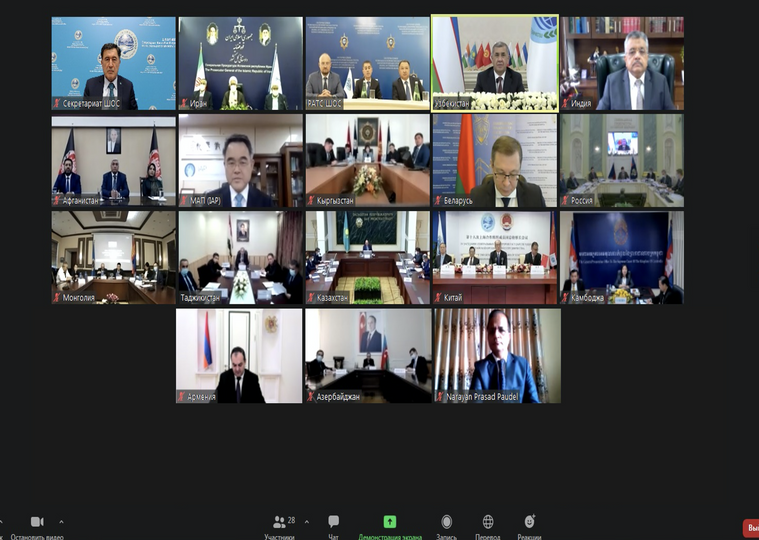The 18th Meeting of the Prosecutors General of the Shanghai Cooperation Organisation was held, via videoconference, on 20 October 2020 under Uzbekistan's chairmanship.
Taking part in the event were Solicitor General of the Republic of India Tushar Mehta, Prosecutor General of the Republic of Kazakhstan Gizat Nurdauletov, Procurator General of the Supreme People's Procuratorate of China Zhang Jun, Prosecutor General of the Kyrgyz Republic Otkurbek Dzhamshitov, Additional Attorney General for the Islamic Republic of Pakistan Aamir Rehman, Prosecutor General of the Russian Federation Igor Krasnov, Prosecutor General of the Republic of Tajikistan Yusuf Rahmon, Prosecutor General of the Republic of Uzbekistan Nigmatilla Yuldashev, SCO Secretary-General Vladimir Norov and Director of the Executive Committee of the SCO's Regional Anti-Terrorist Structure (RATS) Jumakhon Giyosov.
The meeting was also attended by prosecutors general from the SCO observer countries and dialogue partners.
The main topic on the agenda was the current practices and effective technologies for preventing and combating corruption.
SCO Secretary-General Vladimir Norov pointed out in his statement the importance of the subject in the context of the objectives formulated by the SCO heads of state in the spheres of sustainable development and stability and regional security. Corruption in all its forms is a serious problem for all states and societies, considering that it has unfavourable socioeconomic consequences and is undermining democratic values, justice and investment appeal, thereby damaging the countries' international standing.
"The SCO is firmly resolved to strengthening international collaboration in the anti-corruption sphere," Vladimir Norov noted. In accordance with the SCO Development Strategy until 2025, the fight against corruption is an SCO priority in the field of regional security and stability based on comprehensive efforts in accordance with the Agreement on Cooperation in Combating Crime adopted in Tashkent in 2010, including by exchanging experience and information and taking practical measures to promote interaction among the agencies concerned. In addition to this, in their Bishkek Declaration the heads of state called for the further strengthening of international collaboration against corruption aimed at enhancing the effectiveness of state governance and consistent socioeconomic development, as well as at strengthening the international prestige and investment potential of the SCO states.
Vladimir Norov also put forth a number of initiatives of vital significance for the system-wide and consistent implementation of measures against corruption within the framework of the SCO.
He emphasised the importance of creating a common anti-corruption front aimed at rallying the efforts of the SCO member states against corruption. A vital innovation in this sphere could be the use of preventive measures against corruption, including the monitoring and analysis of corruption risks and compliance with the universally recognised anti-corruption standards, the involvement of all the concerned sides, notably government agencies, the quasi-public sector, business circles and civil society, into combating corruption, as well as the promotion of anti-corruption awareness, the drafting of an SCO anti-corruption action plan and the publication of an SCO report on combating corruption.
The SCO Secretary-General added that a new trend in the sphere of anti-corruption collaboration could be the SCO member states' active involvement in the activities of the UN Office on Drugs and Crime and the monitoring procedures stipulated in the OECD's Istanbul Anti-corruption Action Plan.
In addition to this, Vladimir Norov mentioned the importance of creating an atmosphere of intolerance to any forms of corruption and promoting anti-corruption awareness in societies. He proposed discussing the possibility of holding SCO youth competitions to foster anti-corruption views, behaviour and legal awareness among young people.
The SCO Secretary-General concluded his remarks by suggesting that multilateral efforts could be coordinated through roundtable discussions, conferences, training seminars and webinars on anti-corruption collaboration.
The exchange of opinions by the meeting participants led to the drafting of new initiatives on preventing and combating corruption.
It was agreed to hold the next, 19th Meeting of the SCO Prosecutors General in India in 2021.
